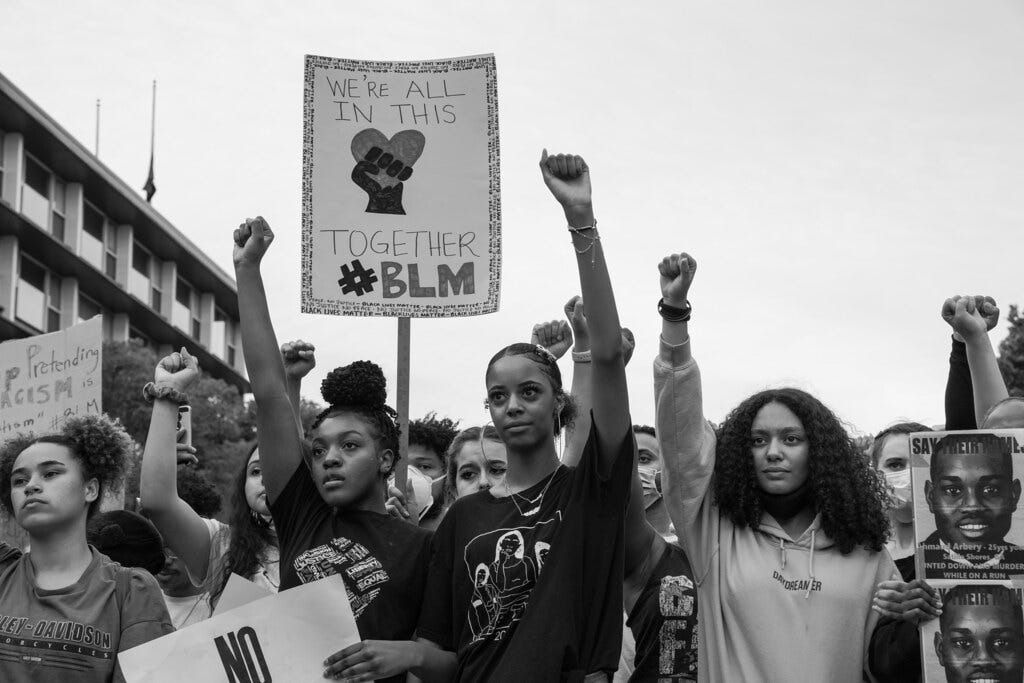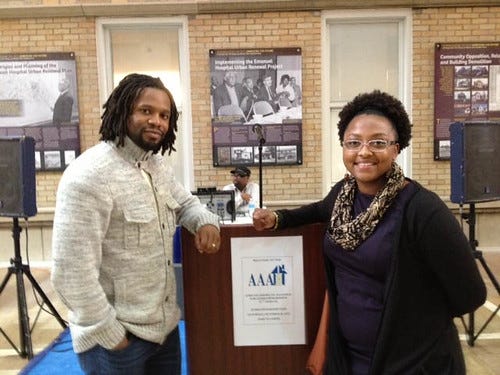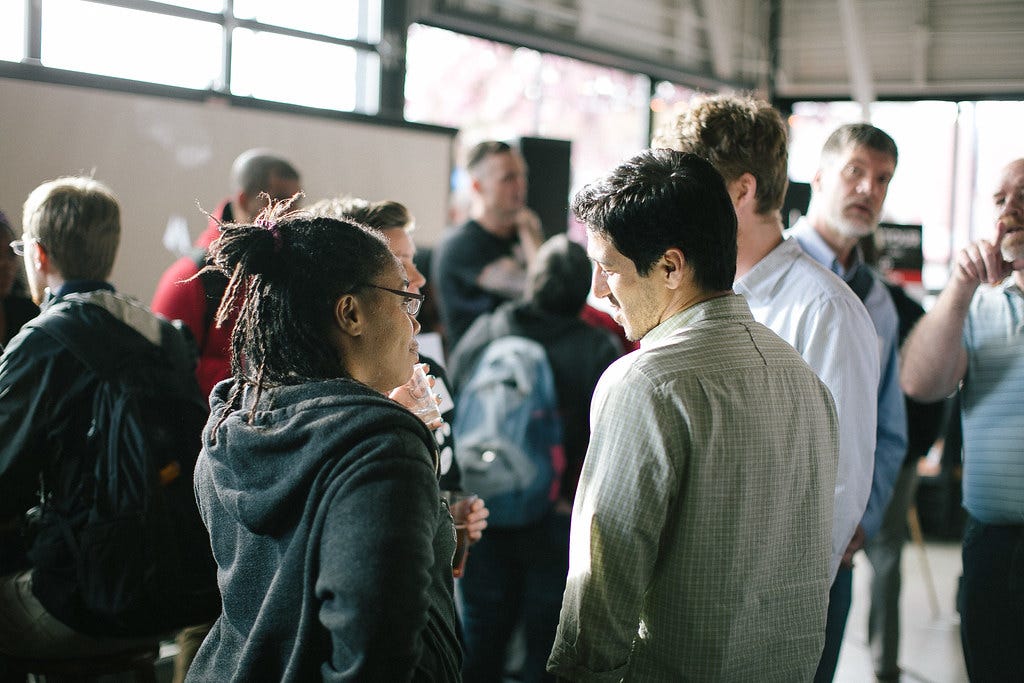Eric K. Ward: What Are Our Think Tanks Thinking?
Where are the Oregon Way think tanks that can help us think differently, think together, think braver and smarter, about the stake we all have in this beautiful state we call home?
Eric K. Ward, Executive Director of Western States Center, Senior Fellow of the Southern Poverty Law Center, Senior Advisor to Race Forward. @BulldogShadow

This summer Oregon came up with an approach to address both the present day and historic needs of those who have long contributed to, but less often benefited from, the wealth of our state; that approach aligned well with the broad notion of an Oregon Way. Now, our “Way”-based solution is under attack by the Center for Individual Rights and an activist with the American Enterprise Institute—ideologically-driven think tanks based 3,000 miles away.
The Oregon Way reported earlier this week that “[e]ighty percent of Oregonians are worried about Oregon’s future” and only a third reported feeling like we can “find common ground and come together next year to address our state’s challenges.”
Might our collective pessimism be fed by the degree to which we are subject to externally-created problems and externally-determined solutions? Might the two-thirds of us who lack confidence about common-ground solutions feel differently if there were more homegrown ways to come together to define the problems we need to address?
It begs the question: Who does define the problems we need to solve as Oregonians? Who collects the data, does the research, tests the innovations? Who comes up with the policy solutions Oregonians need? Do we have our own think tanks? And, are they talking to each other?
The Oregon Cares Fund: A Uniquely Oregon Approach

The Oregon Cares Fund for Black Relief + Resiliency was created by the bipartisan legislative Emergency Board in July with $62 million of the federal CARES Act Coronavirus Relief Fund. This represents a modest four and one-half percent of the state’s share of the federal relief, reflecting, according to the fund’s proponents, “an investment in those disproportionately affected by the COVID-19 pandemic due to pre-existing biases in our socio-economic systems.”
Oregon – with our painful history of exclusionary racism and important moments of anti-racism – should be proud to be the only state that has lifted up the Black community for a designated, if small, portion of relief funds. Especially given that, nationally, relief has flowed disproportionately to “the wealthy and companies that laid off workers,” as The Washington Post recently reported.
It should be hard to argue that this four and one-half percent designation is not justified. The case for the investment was made in an open letter from leaders in Oregon’s Black community to Governor Brown and the legislature; More than 4,500 other signatories joined that letter. Support for this approach extended far beyond the four corners of a single letter and justification for the modest ask incorporated a broad range of evidence. Beyond the supporting data detailed on the fund’s website, OregonLive recounted that:
Black Oregonians are more than three times as likely as white Oregonians to contract COVID-19 (Oregon Health Authority);
Black business owners had a harder time securing coronavirus financial relief than white business owners (National Community Reinvestment Coalition);
The number of Small Business Administration loans going to Black-owned businesses has declined significantly since the Great Recession (Business Journals); and,
Black-owned businesses in Oregon have obtained fewer Paycheck Protection Program loans than any other racial group (Business Journals).
A state with a reputation for innovation and D.C.-based intrusion
Despite broad community support and extensive evidence of need and bias, conservative legal activist Edward Blum, associated with the American Enterprise Institute and the Center for Individual Rights, has filed what Governor Brown and Attorney General Ellen Rosenblum have called “pernicious and ideologically-motivated lawsuits to impede our efforts to deliver critical resources to Oregonians amid a devastating pandemic.”
It’s not the first time out-of-state interests have tried to dictate, influence, or override the Oregon Way. In fact, Oregon has long been treated as a proving ground by activists across the ideological spectrum seeking to establish a precedent they could replicate in other states – from attempting to limit the power of public employee’s unions to establishing drug policy.
The initiative petition, known nationally as “the Oregon System,” was first established in the Oregon constitution in 1902 to allow citizens to bypass the representative decision-making of the legislature. Since then, it’s been responsible for many other firsts: the first “death with dignity” law, the first vote-by-mail system, the first to decriminalize marijuana and legalize therapeutic use of psilocybin, to name a few. Some of these pioneering efforts are legitimately home grown. Other initiative campaigns have been bankrolled by those seeking to exploit the openness of our system to advance an externally-determined agenda, including a long list of failed efforts that nonetheless expended millions of dollars and took a heavy toll on the Oregonians they targeted, and the voters and state systems dragged through the campaigns.
The Data No One Collects, The Reports No One Reads

When it comes to understanding the problems we face as Oregonians and designing our own solutions, where are our Oregon Way think tanks? Who’s doing the research, collecting and analyzing the data, bringing people together across perceived differences to chart a shared vision and a path to get there?
The Oregon Cares Fund is easily justified by a range of indicators, including common sense. But it could be subject to a constitutional test requiring “evidence of past discrimination in the economic sphere.” The legislature’s lawyers warned “we are not aware of any evidence developed by the state to support the grant program at issue.” This is exactly the sort of evidence that courts may heavily weigh when reviewing cases in this legal realm. For example, the Supreme Court’s decision to uphold the University of Texas’ affirmative action plan was, in part, based on the University’s extensive research into why its approach was necessary to achieve the institution’s goals. Apparently, similar research hasn’t been done by the State of Oregon.
How could this be? How could it be that something as painfully obvious as the historic and present-day reality of anti-Black economic discrimination is not amply demonstrated by a record of investigation by our state legislature?
In their case for the Cares Fund, leaders wrote: “To put it simply, the State has never prioritized the policies, practices, or systems required to hold itself accountable to providing equitable services and resources.”
Another ad hoc group of Black Oregonians highlighted this same vacuum of research and imagination in the wake of George Floyd’s extrajudicial killing. In forming Reimagine Oregon, they wrote:
When the protests started it seemed as if lawmakers got stuck in a dangerous rut of “Acknowledgment and Apology.” They would schedule these press conferences acknowledging the pain and plight of Black people, apologize for their part in it, then go right back to business as usual with no substantive commitment to change. In the civil rights era, many leaders engaged in long-term discussions that centered long-term change, the advancement of equality and resulted in sweeping changes that many of us rely on for protection today. So it was baffling, then, that our elected leaders weren’t debriefing us on any meetings or discussions about what kind of long-term change could or would be enacted.
The group came to a somewhat astonishing conclusion, given the unprecedented times we are in: “We don’t need to make any new demands.” Instead they assembled a list of policy proposals in eight arenas, drawing from the “pages and pages” of documents “already crafted, already proposed, and already being discussed.” Numerous advocacy organizations had already done the research and development. The problem was their expert output was sitting on a shelf without the heft of a think tank or the mandate-making of a broader organizing effort.
Who Are Our Think Tanks?
When I say ‘”Oregon Think Tank” – what comes to mind? Do we have any? Who are they?
We have no shortage of organizations and institutes based in particular constituencies and communities or focused on specific issues. Some are able to make their case for change and propose solutions using Oregon-specific data and idea generation. Others rely on their national affiliates or networks of peer organizations in other states for models that can be tailored locally.
Our elected officials and public agency heads similarly rely on their national associations of cities, counties, state legislatures, governors, sheriffs, health officers, and so on. Many problem statements and policy solutions are now branded by political party or other ideological frames. Think tanks themselves are typically reliant on funders with an ideological agenda, or on fee-for-service contracts that prioritize customer satisfaction over the common good.
Google suggests two answers to my question: The Oregon Center for Public Policy, a progressive research and policy shop called “. . .one of Oregon's brightest advocacy organizations, speaking out for the underserved with verifiable facts and sources,” by Robin Wisdom, former President, League of Women Voters of Oregon. Current website banner: “Towards Prosperity for All Oregonians: Raise Taxes on the Rich.”
Then there’s the conservative/ libertarian Cascade Policy Institute, which radio personality Lars Larson called “the premier think tank in Oregon. There’s no question about it.” Their slogan: “Progress Requires Freedom,” is spelled out as individual liberty, property rights, incentives, markets, and decentralized decision making.
Beyond the ideological distinctions, you wouldn’t know one from the other by their “what we do” descriptions. Can you tell which is which?
We are a nonprofit, nonpartisan public policy research and educational organization that focuses on state and local issues in Oregon…. [We advance our] values by sharing [our] research with the public, the media, and state and local lawmakers through publications, educational programs, community forums, and special events.
We are a non-partisan, non-profit organization that researches and analyzes tax, budget, and economic issues. We share our information with all Oregonians, and pay particular attention to putting our work in the hands of lawmakers, the media, and politically-engaged Oregonians. We work with lawmakers to design the best policies to enrich the lives of all Oregonians.
Surely there are other organizations and initiatives you might name. But what I’m most interested in is this: are they talking to each other? What is the role of those who think for a living about the state and local issues facing Oregon, in bringing us together to understand the problems we’re facing and to build solutions based on that common ground?
The need for homegrown “thinking”

We think 2020 has been hard. And it has been. I fear 2021 and the years to come will be no easier. The sources of present-day tumult have not disappeared: The climate chaos of extreme wildfires, storms, and drought, the economic devastation, the public health crisis of the pandemic, the rise of armed paramilitaries, the plummeting confidence in democratic institutions, and long-term systemic inequities and implicit bias begging for remediation.
Earlier this fall Citigroup released a study, titled “The Economic Cost of Black Inequality in the U.S.” The study estimates that the economy would see a $5 trillion boost over the next five years if the U.S. were to tackle key areas of discrimination against African Americans. (That’s nearly a quarter of the $19.5 trillion national GDP last year). I’m no math whiz, but if Oregon were to reap only 1% of this national prosperity, it would mean $50 billion in new resources.
The Citigroup study illustrates the importance of inter-group solutions, of seeing the benefit to all by lifting up those who’ve been shut out historically. Can we come out from the bunkers of party and ideology to rebuild an understanding of our inter-dependence? Of a vision that leaves no one behind? Where are the Oregon Way think tanks that can help us think differently, think together, think braver and smarter, about the stake we all have in this beautiful state we call home?
************************************************
Connect with Eric:
@BulldogShadow
Keep the conversation going:
Facebook (facebook.com/oregonway), Twitter (@the_oregon_way)
Check out our podcast:



